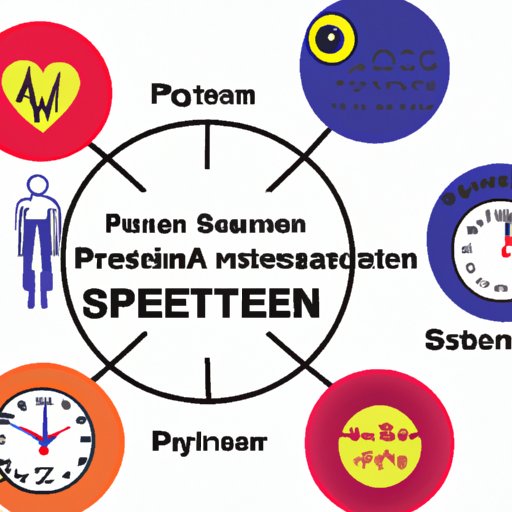Introduction
Blood pressure is a vital sign that measures the force of the blood against the walls of your arteries. It is made up of two numbers: systolic pressure (the top number) which measures the pressure in your arteries when your heart contracts, and diastolic pressure (the bottom number) which measures the pressure in your arteries when your heart relaxes. The normal range for adults is 120/80 mmHg, with anything higher than 140/90 mmHg being considered high.
Your body has its own natural circadian rhythm, or 24-hour cycle, that impacts your blood pressure. During the day, your blood pressure tends to be higher, while during the night it tends to be lower. Understanding this natural cycle can help you better monitor your blood pressure and make necessary lifestyle changes if needed.

Analyzing the Circadian Rhythm of Blood Pressure
Stress is one of the main factors that can affect your blood pressure, and it can have a greater impact during the day than at night. During the day, stress hormones like cortisol are released, causing your heart rate and blood pressure to rise. If you’re feeling particularly stressed during the day, it’s important to practice stress-reduction techniques such as deep breathing and mindfulness meditation.
Exercise is another important factor in blood pressure regulation. Regular physical activity can help reduce both systolic and diastolic blood pressure. However, it’s important to note that exercising too close to bedtime can raise your blood pressure and interfere with your ability to fall asleep. Aim to complete your workout at least three hours before bedtime.

Exploring How Diet Affects Blood Pressure
Your diet plays an important role in managing your blood pressure. Eating a healthy, balanced diet rich in fresh fruits and vegetables, whole grains, lean proteins, and healthy fats can help keep your blood pressure under control. Avoiding processed foods, added sugars, and sodium can also help maintain healthy blood pressure levels.
It’s important to monitor your blood pressure throughout the day to get an accurate picture of your health. The best time to check your blood pressure is in the morning after you wake up and before you eat breakfast. This will give you a good baseline for your blood pressure levels.
Examining the Role of Sleep in Blood Pressure Regulation
Getting enough quality sleep is essential for maintaining optimal blood pressure levels. A regular sleep schedule helps regulate your body’s circadian rhythm, which in turn helps regulate your blood pressure. Aim to get seven to nine hours of sleep each night and avoid caffeine and alcohol close to bedtime.
Healthy sleep habits can also help reduce stress levels and improve overall well-being. Create a calming pre-bedtime routine to help your body wind down and get ready for sleep. This could include reading, stretching, or listening to calming music.
Conclusion
In conclusion, understanding the natural circadian rhythm of your blood pressure is key to monitoring and managing it. Stress, exercise, diet, and sleep all play a role in regulating your blood pressure levels. The best time to check your blood pressure is in the morning before you eat breakfast. Finally, it’s important to maintain healthy sleep habits to help reduce stress levels and improve overall well-being.
By taking the time to understand how your body responds to different stimuli, you can make informed decisions about your health and wellbeing. With the right knowledge and lifestyle changes, you can keep your blood pressure at a healthy level.


